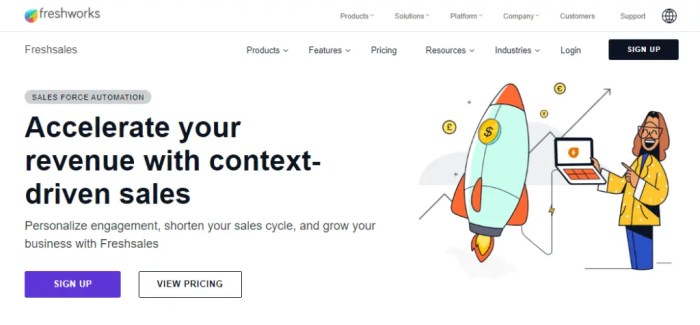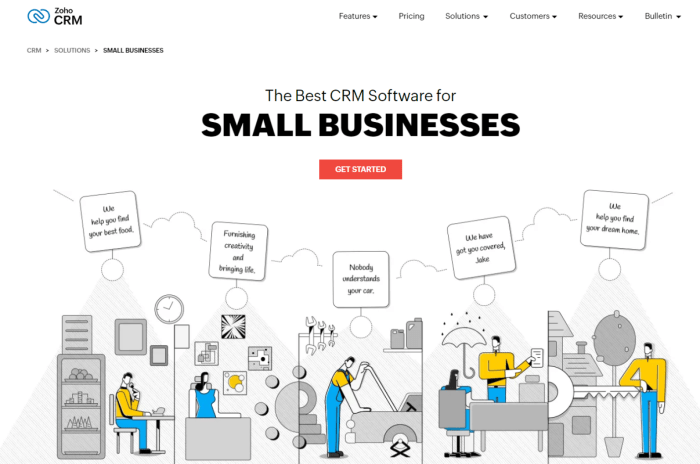Best crm software for large business – Choosing the right Customer Relationship Management (CRM) software is crucial for large businesses. A robust CRM system can streamline operations, improve customer engagement, and ultimately drive revenue growth. However, with a plethora of options available, selecting the ideal solution can feel overwhelming. This comprehensive guide explores the key features, considerations, and top contenders for large enterprise CRM software, helping you navigate the selection process effectively.
Understanding the Needs of Large Businesses
Large enterprises have unique CRM requirements compared to smaller businesses. They often need solutions that can handle:
- High volumes of data: Managing millions of customer interactions and data points requires a scalable and efficient CRM system.
- Complex sales processes: Long and intricate sales cycles necessitate robust features for opportunity management, pipeline tracking, and forecasting.
- Multiple departments and users: Integration with various departments (sales, marketing, customer service) and seamless collaboration across numerous users are essential.
- Advanced reporting and analytics: Detailed insights into customer behavior, sales performance, and marketing campaign effectiveness are critical for strategic decision-making.
- Robust security and compliance: Protecting sensitive customer data and adhering to industry regulations are paramount.
- Customizability and integrations: Adaptability to specific business processes and seamless integration with existing systems are vital.
Key Features to Consider in a Large Business CRM: Best Crm Software For Large Business
When evaluating CRM software for a large enterprise, prioritize these essential features:
Sales Force Automation (SFA), Best crm software for large business
- Lead management: Efficiently capturing, qualifying, and nurturing leads.
- Opportunity management: Tracking sales opportunities, forecasting revenue, and managing the sales pipeline.
- Contact management: Centralized database for storing and managing customer information.
- Sales process automation: Automating repetitive tasks to free up sales representatives’ time.
Marketing Automation
- Marketing campaign management: Planning, executing, and tracking marketing campaigns across multiple channels.
- Email marketing: Personalized email campaigns for improved customer engagement.
- Social media integration: Monitoring social media activity and engaging with customers.
- Lead scoring and nurturing: Prioritizing high-potential leads and nurturing them through the sales funnel.
Customer Service and Support
- Case management: Tracking and resolving customer issues efficiently.
- Knowledge base: Providing self-service options for customers to find answers to their questions.
- Live chat and support: Offering real-time support to customers.
- Customer feedback management: Collecting and analyzing customer feedback to improve products and services.
Reporting and Analytics
- Customizable dashboards: Visualizing key performance indicators (KPIs) to monitor progress and identify areas for improvement.
- Sales forecasting: Predicting future sales based on historical data and current trends.
- Marketing analytics: Measuring the effectiveness of marketing campaigns.
- Customer segmentation: Grouping customers based on shared characteristics to personalize marketing efforts.
Top CRM Software for Large Businesses
Several CRM solutions cater specifically to the needs of large enterprises. Here are some leading contenders:
- Salesforce: A highly scalable and customizable platform with a wide range of features and integrations. Known for its robust ecosystem and extensive support. [Source: Salesforce Website ]
- Microsoft Dynamics 365: A comprehensive suite of business applications, including CRM, that integrates seamlessly with other Microsoft products. Offers strong reporting and analytics capabilities. [Source: Microsoft Dynamics 365 Website ]
- Oracle Siebel CRM: A mature and robust solution particularly well-suited for large, complex organizations. Known for its strong industry-specific solutions. [Source: Oracle Siebel CRM Website ]
- SAP CRM: Integrated with other SAP enterprise resource planning (ERP) solutions, offering a comprehensive view of the business. Ideal for large organizations with existing SAP systems. [Source: SAP CRM Website ]
- Zoho CRM: While often associated with smaller businesses, Zoho CRM offers scalable plans capable of handling large datasets and user bases, providing a cost-effective alternative for some large enterprises. [Source: Zoho CRM Website ]
Choosing the Right CRM: Factors to Consider
Selecting the best CRM for your large business depends on several factors:
- Budget: CRM solutions vary significantly in price, with enterprise-level options often requiring substantial investment.
- Scalability: Ensure the CRM can handle your current and future data volume and user needs.
- Integration capabilities: The CRM should seamlessly integrate with your existing systems (ERP, marketing automation, etc.).
- Customization options: Consider whether you need a highly customizable solution to align with your unique business processes.
- User-friendliness: The CRM should be intuitive and easy for your employees to use.
- Vendor support: Choose a vendor with a strong track record of providing reliable support and maintenance.
Implementation and Training
Successful CRM implementation goes beyond software selection. It requires careful planning, execution, and ongoing training. Consider:
- Data migration: Moving your existing customer data into the new CRM system requires careful planning and execution.
- User training: Providing adequate training to your employees is essential for maximizing the CRM’s effectiveness.
- Change management: Communicating the benefits of the new CRM and addressing employee concerns is crucial for successful adoption.
- Ongoing support and maintenance: Regular maintenance and updates are necessary to ensure the CRM continues to function optimally.
Frequently Asked Questions (FAQ)
- Q: What is the average cost of CRM software for large businesses? A: The cost varies greatly depending on the features, number of users, and vendor. Expect significant investment, often in the tens or hundreds of thousands of dollars annually.
- Q: How long does it take to implement a CRM system? A: Implementation time depends on the complexity of the system and the size of your organization. It can range from several months to over a year.
- Q: What are the key metrics to track after CRM implementation? A: Track key metrics like sales conversion rates, customer satisfaction, lead response times, and marketing ROI.
- Q: How can I ensure data security in my CRM system? A: Choose a vendor with robust security measures, implement strong access controls, and regularly back up your data.
- Q: What are the benefits of cloud-based CRM vs. on-premise CRM for large businesses? A: Cloud-based CRMs offer scalability, accessibility, and lower upfront costs, while on-premise solutions provide greater control over data and security but require significant IT infrastructure investment.
Conclusion
Selecting the right CRM for your large business is a critical decision that can significantly impact your operational efficiency, customer relationships, and bottom line. By carefully considering your specific needs, evaluating key features, and choosing a reputable vendor, you can successfully implement a CRM system that drives growth and enhances your competitive advantage.
Call to Action
Ready to take the next step in optimizing your customer relationships? Contact us today for a free consultation to discuss your CRM needs and explore the best solutions for your large business.
Quick FAQs
What are the typical costs associated with large business CRM software?
Costs vary significantly depending on the vendor, features, and number of users. Expect a range from several hundred to several thousand dollars per month, often with tiered pricing based on usage.

Source: workjo.com
How long does it typically take to implement a large business CRM system?

Source: pttrns.com
Implementation timelines vary widely, but generally range from several weeks to several months, depending on the complexity of the system and the organization’s size and processes.
What is the importance of data security in choosing a CRM for a large business?
Data security is paramount. Choose a vendor with robust security measures, including encryption, access controls, and compliance with relevant data privacy regulations.
How can I ensure my chosen CRM integrates with my existing business systems?
Thoroughly investigate API integrations offered by potential CRM vendors. Verify compatibility with your current systems (ERP, marketing automation, etc.) before making a decision.
